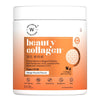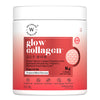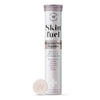In recent years, collagen has gained popularity as a sought-after component in cosmetics, supplements, and even food and beverage options. It is commonly commended for its anti-aging and joint-supporting properties and is well known for its role in the health and flexibility of our skin, hair, nails, and joints. However, like with any health trend, it has left people with more question like who is it for or is it necessary to invest in collagen supplements. In this blog, we'll examine the advantages of collagen, including how it enhances joint comfort and skin health, as well as the variables that influence its synthesis. Continue reading to get all your answers!
What is Collagen?
Collagen is one of the main building blocks inside our body. It is a type of protein found in our skin, muscles, bones, tendons, hair, and nails and makes up one-third of our protein base. It's no secret that collagen is good for the skin. But did you know that it can also assist to boost the condition of your bones and hair in addition to giving you supple and young skin? Since collagen is the primary structural protein in your bones, taking a collagen supplement will result in strong bones. Your hair is primarily made of a protein called keratin, and collagen plays a vital role in providing the amino acids required for the production of keratin. In a nutshell, this one protein called collagen can improve your skin, hair, nails, and bone health at the same time.
Types of collagen
Type I: 90% of the collagen in your body is Type I. Your skin, bones, tendons, and ligaments are structurally supported by type I.
Type II: Elastic cartilage, which supports joints, contains type II.
Type III: Organs, arteries, and muscles all contain type III collagen.
Type IV: It is present in the layers of our skin.
Type V: The corneas of your eyes, some skin layers, hair, and placental tissue contain Type V.
Sources of Collagen
Collagen is made using 3 amino acids: glycine, proline, and hydroxyproline. Hence, high-protein sources that contain these 3 amino acids are considered potent sources of collagen. Having fish, meat, eggs, milk, legumes, and soy can help you supply your body with collagen.
What are Collagen Peptides?
Peptides are nothing but a simpler form of collagen. When your body gets nutrition from food, it has to spend a lot of time and energy processing the food to absorb all the nutrients. Collagen peptides make it easier for your body. Collagen derived from animal sources is broken down into smaller pieces to form peptides that can be easily absorbed.
Foods Good for Collagen Production
Collagen starts off in our bodies as procollagen, which is a combination of glycine and proline. To create procollagen, your body requires vitamin C.
But how do we restore collagen? Let’s take a look at what foods can help this process.
- Vitamin C: The best way to provide your body with vitamin C is through citrus fruits like oranges, lemons, limes, and more. You can also find vitamin C in bell peppers, strawberries, Brussels sprouts, and kiwis.
- Proline: Proline can be found in egg whites, dairy products, asparagus, cabbage, and mushrooms, among other things.
- Glycine: For glycine, you should look to consume more pork and chicken skin, gelatin, and other protein-rich foods.
- Copper: You can find copper in organ meats, cocoa powder, cashews, and lentils, among other things.
Food Sources to Increase Collagen Production
Consuming a well-balanced diet rich in protein, vitamin C, antioxidants, zinc, and copper, along with foods containing omega-3 fatty acids and sulfur can help support collagen formation in the body.
Meat, fish, eggs, citrus fruits, berries, nuts, seeds, dark leafy greens, and bone broth can all supply the nutrients needed to maintain healthy collagen levels.
Foods Bad for Collagen Production
If you want your collagen levels to be at their highest, then there are certain things that you need to avoid. The guidelines for collagen maintenance include the following:
- Avoid sugar: Eating too much sugar prevents the collagen in your body from repairing itself, thereby making it necessary to limit its consumption.
- Avoid refined carbs: Too many carbs can prevent collagen’s ability to heal and repair itself.
- Avoid excessive sun exposure: UV rays can reduce your body’s ability to produce collagen, making it necessary to limit your sun exposure to 20–30 minutes a day.
- Avoid smoking: It is observed that smoking reduces collagen production in the body, thereby making you more prone to wrinkles and preventing wound healing.
Certain autoimmune disorders, such as lupus, can also damage collagen production.
Who Should Avoid Collagen?
While collagen supplements are generally considered safe for most people, there are certain individuals who may need to exercise caution or avoid collagen supplementation. These include:
1. Pregnant or breastfeeding:
Because the safety of collagen supplements during pregnancy and breastfeeding has not been completely tested, it is advised to speak with a healthcare expert before taking collagen supplements during these times.
2. Those with known allergies or sensitivities:
Because some collagen supplements are produced from animal sources, such as beef, poultry, or fish, they may trigger allergic reactions in people who are allergic or sensitive to these substances. Before taking collagen supplements, read the labels carefully and look for potential allergies.
3. Individuals with medical conditions:
If you have a medical condition, such as liver or kidney disease, or are undergoing treatment for a specific health condition, you should consult with your healthcare professional before taking collagen supplements, as they may interact with certain medications or pose potential health risks.
4. Vegetarians or vegans:
Collagen supplements are primarily sourced from animal sources, therefore, vegetarians and vegans should avoid them. Vegetarians and vegans may opt for plant-based alternatives or think about other ways to boost collagen production through food and lifestyle.
5. Children:
Collagen supplements are normally not suggested for children since their nutritional demands differ from those of adults, and safety and efficacy in children have not been adequately demonstrated.
Is it Safe to Take Collagen Supplements on a Daily Basis?
Collagen supplements may be safe to take on a regular basis for most people, but some variables must be considered. Take the suggested dosage, choose reliable brands, be mindful of potential sensitivities or interactions with drugs or medical conditions, and remember that collagen supplements are not a substitute for a healthy diet. Those who are pregnant or breastfeeding, as well as those with certain medical issues, should check with their doctor before using collagen supplements. To ensure safety and efficacy, always seek the advice of a qualified healthcare professional before beginning a new supplement regimen.
Which Wellbeing Nutrition Collagen Supplements Can You Take?
You can try out Skin Fuel by Wellbeing Nutrition, India's First US Dermatologist Formulated Drinkable Skincare. Made using naturally derived, widely researched ingredients - L–glutathione, hyaluronic acid, Japanese collagen, and other essential vitamins, this delicious blueberry mint skin elixir will keep your skin youthful, supple, and glowing. Then you also have the Pure Marine Collagen Peptides collection, focusing on different aspects such as Glow and Beauty—ensuring you are glowing inside and out!
Wrapping Up
Collagen has received a lot of attention due to its potential benefits for skin health, joint function, and overall wellness. It can be an important part of a healthy lifestyle and skincare routine. But it's crucial to proceed with caution and be aware of potential drawbacks, such as source difficulties, a lack of scientific evidence, and potential allergies or unpleasant reactions. Before beginning any new supplement or skincare program, always consult with a healthcare expert or a dermatologist. You can make an informed decision about whether collagen is right for you if you understand both the positive and negative sides of it.
References:
- Hydrolyzed Collagen—Sources and Applications, Arely León-López,1 Alejandro Morales-Peñaloza,2 Víctor Manuel Martínez-Juárez,1 Apolonio Vargas-Torres,1 Dimitrios I. Zeugolis,3,4 and Gabriel Aguirre-Álvarez1, Molecules Journal, 2019, (https://www.ncbi.nlm.nih.gov/pmc/articles/PMC6891674/)
- Beneficial effects of food supplements based on hydrolyzed collagen for skin care (Review), Mihaela-Adi Lupu, Gratiela Gradisteanu Pircalabioru, Mariana-Carmen Chifiriuc, Radu Albulescu, and Cristiana Tanase, Experimental and Therapeutic Medicine, doi: 10.3892/etm.2019.8342, (https://www.ncbi.nlm.nih.gov/pmc/articles/PMC7271718/)
- Effects of a nutritional supplement containing collagen peptides on skin elasticity, hydration and wrinkles, Journal of Medical Nutrition and Nutraceuticals, Maryam Borumand, Sara Sibilla, (https://www.jmnn.org/article.asp?issn=2278-1870;year=2015;volume=4;issue=1;spage=47;epage=53;aulast=Borumand)
- How much sun is too much? InformedHealth.org, (https://www.ncbi.nlm.nih.gov/books/NBK321117/)
- Is Collagen Good for Your Skin? (https://expertateverything.in/is-collagen-good-for-your-skin/)































